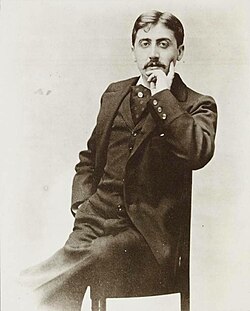Marcel Proust Quote
From the sound of pattering raindrops I recaptured the scent of the lilacs at Combray; from the shifting of the sun's rays on the balcony the pigeons in the Champs-Elysées; from the muffling of sounds in the heat of the morning hours, the cool taste of cherries; the longing for Brittany or Venice from the noise of the wind and the return of Easter. Summer was at hand, the days were long, the weather was warm. It was the season when, early in the morning, pupils and teachers repair to the public gardens to prepare for the final examinations under the trees, seeking to extract the sole drop of coolness vouchsafed by a sky less ardent than in the midday heat but already as sterilely pure.
From the sound of pattering raindrops I recaptured the scent of the lilacs at Combray; from the shifting of the sun's rays on the balcony the pigeons in the Champs-Elysées; from the muffling of sounds in the heat of the morning hours, the cool taste of cherries; the longing for Brittany or Venice from the noise of the wind and the return of Easter. Summer was at hand, the days were long, the weather was warm. It was the season when, early in the morning, pupils and teachers repair to the public gardens to prepare for the final examinations under the trees, seeking to extract the sole drop of coolness vouchsafed by a sky less ardent than in the midday heat but already as sterilely pure.
Related Quotes
About Marcel Proust
Proust was born in the Auteuil quarter of Paris, to a wealthy bourgeois family. His father, Adrien Proust, was a prominent pathologist and epidemiologist who studied cholera. His mother, Jeanne Clémence Weil, was from a prosperous Jewish family. Proust was raised in his father's Catholic faith, though he later became an atheist. From a young age, he struggled with severe asthma attacks which caused him to have a disrupted education. As a young man, Proust cultivated interests in literature and writing while moving in elite Parisian high society salons frequented by aristocrats and the upper bourgeoisie. These social connections provided inspiration and material for his later novel. His first works, including the collection of stories Les plaisirs et les jours, were published in the 1890s to little public success.
In 1908, Proust began work on À la recherche du temps perdu. The novel consists of seven volumes totaling around 1.25 million words and featuring 2,000 characters. It explores themes of memory, art, love, High Society and the human experience through the narrator's recollections. Begun when Proust was 38, the novel was partially published in his lifetime, with the initial sections appearing in 1913. The remaining volumes were revised and published posthumously by his brother Robert based on drafts and proofs. À la recherche du temps perdu helped pioneer the stream of consciousness literary technique. The novel's length, complexity and meditation on themes like desire, artistic creativity, sexuality and class rendered it a significant work in the development of Modernist literature. The work was translated into English by C. K. Scott Moncrieff and others.
Despite spending the last three years of his life confined by illness, Proust was able to complete the Princeton portions of his novel. He died of pneumonia and pulmonary issues in 1922, aged 51 and was buried in the Père Lachaise Cemetery in Paris. Proust's sexuality and relationships with men were an open secret among his social circles, though the author himself never publicly acknowledged being homosexual.
